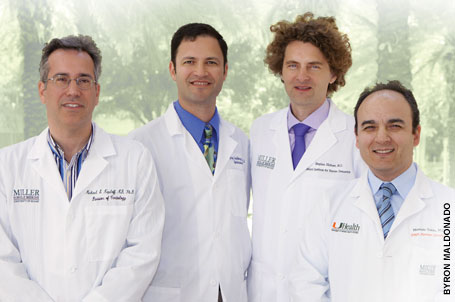 |
 |
Four Faculty Members Elected to
Prestigious
ASCI Honor Society
Four Miller School physician-scientists have been inducted into the American Society for Clinical Investigation (ASCI), one of the nation’s oldest and most respected medical honor societies. The honorees are Jeffrey Goldberg, M.D., Ph.D., associate professor of ophthalmology, Michael Kapiloff, M.D., Ph.D., associate professor of pediatrics and medicine, Mustafa Tekin, M.D., associate professor of genetics, and Stephan Züchner, M.D., associate professor of genetics.
 |
| New ASCI inductees Michael Kapiloff, M.D., Ph.D., associate professor of pediatrics and medicine, Jeffrey Goldberg, M.D., Ph.D., associate professor
of ophthalmology, Stephan Züchner, M.D., associate professor of genetics, and Mustafa
Tekin, M.D., associate professor of genetics. |
Since members must be 45 or younger at the time of their election, their membership generally reflects research accomplishments made early in their scientific career. Typically, not even one individual is elected per U.S. medical school in a single year.
“Since 2009 the Miller School has had nine faculty members invited to join the ASCI, and this shows how fast our talent pool is growing in relation to other universities,” said Dean Pascal J. Goldschmidt, M.D. “It is quite an honor for these four faculty members to be recognized for their re
search achievements and for all of us to have these brilliant physician-scientists as colleagues.
Goldberg has focused his research on why optic nerve stroke, trauma, or neurodegeneration (such as glaucoma) leads to permanent vision loss. He has defined a separate way of looking at regenerative failure—the intrinsic problem in the neurons themselves. In a pair of papers published in the journal Science, he helped create a new focus on understanding the failure and developing new treatments to overcome it.
The research of Kapiloff on A-kinase anchoring proteins and
the basic mechanisms of cardiac signal transduction are advancing the frontiers of clinical cardiology. In particular, his work on mAKAP has helped transform the concept of a cell from one involving primarily soluble biochemical reactions to one that is regulated by localized,
functionally differentiated multimolecular signal complexes. He has contributed to the understanding of intracellular signaling pathways, including how they may be composed of different sets of the same signaling molecules and how pathways may participate in crosstalk while specifically regulating cellular function.
As a clinical geneticist, Tekin is focused on the phenotypic and genotypic characterization of a variety of Mendelian disorders, including the genetics and genomics of hearing loss. His laboratory has identified mutations in SERPINB6, FGF3, and MASP1 as causes of nonsyndromic and syndromic forms of hearing loss and demonstrated the fundamental roles the products of these genes play during embryonic development and for the maintenance of physiological functions.
Trained as a neurologist, Züchner has a longstanding research focus in the genetic basis of neurological and psychiatric diseases. Among his major achievements are the identification of two genes for peripheral axonal neuropathies and a gene for hereditary spastic paraplegia, as well as two candidate genes for the obsessive-compulsive spectrum of disorders. Züchner has also pioneered applications for next-generation sequencing, including exome sequencing, deep mitochondrial sequencing, and animal model sequencing.
|
 |
 |


